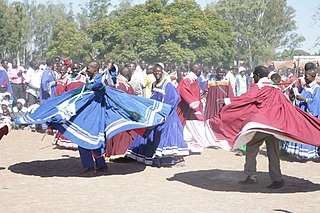 W
WReligion in South Africa is dominated by various branches of Christianity. South Africa is a secular state with a diverse religious population. Its constitution guarantees freedom of religion. Many religions are represented in the ethnic and regional diversity of the population.
 W
WAfrican Zionism, is a religious movement with 15–18 million members throughout Southern Africa, making it the largest religious movement in the region. It is a combination of Christianity and African traditional religion. Zionism is the predominant religion of Eswatini and forty percent of Swazis consider themselves Zionist. It is also common among Zulus in South Africa. The amaZioni are found in South Africa, Eswatini, Mozambique, Malawi, Zimbabwe, Botswana, and Namibia.
 W
WBuddhist traditions are represented in South Africa in many forms. Although the inherently introspective nature of Buddhism does not encourage census, adherents to these traditions are usually outspoken and supported by perhaps an even greater, though hidden number of sympathisers. Temples, centres and groups are common in the metropolitan areas and the country is thought to comprise the largest Buddhist community in Africa.
 W
WChristianity is the dominant religion in South Africa, with almost 80% of the population in 2001 professing to be Christian. No single denomination predominates, with mainstream Protestant churches, Pentecostal churches, African initiated churches, and the Catholic Church all having significant numbers of adherents. Importantly, there is significant and sustained syncretism with African Traditional Religion among most of the self-professed Christians in South Africa.
 W
WNeopaganism in South Africa is primarily represented by the traditions of Wicca, contemporary Witchcraft, Germanic neopaganism and Neo-Druidism. The movement is related to comparable trends in the United States and Western Europe and is mostly practiced by White South African of urban background; it is to be distinguished from folk healing and mythology in local Bantu culture.
 W
WThe Ngcobo Police Killings took place on 21 February 2018; five police officers and an off-duty soldier were shot and killed by armed gunmen, who stormed into a police station in the small town of Ngcobo, in the Eastern Cape, South Africa. Three days later, police authorities traced the suspects to a local church called the Seven Angels Ministry, a compound the local authorities soon learned doubled as an isolationist cult that encouraged underage girls to have sex with the church leaders as a tribute to God. The police raid resulted in a shootout, killing seven people within the compound, some of whom the police believed to have orchestrated the shooting at the local precinct three days earlier.
 W
WThe Witchcraft Suppression Act 3 of 1957 is an act of the Parliament of South Africa that prohibits various activities related to witchcraft, witch smelling or witch-hunting. It is based on the Witchcraft Suppression Act 1895 of the Cape Colony, which was in turn based on the Witchcraft Act 1735 of Great Britain.